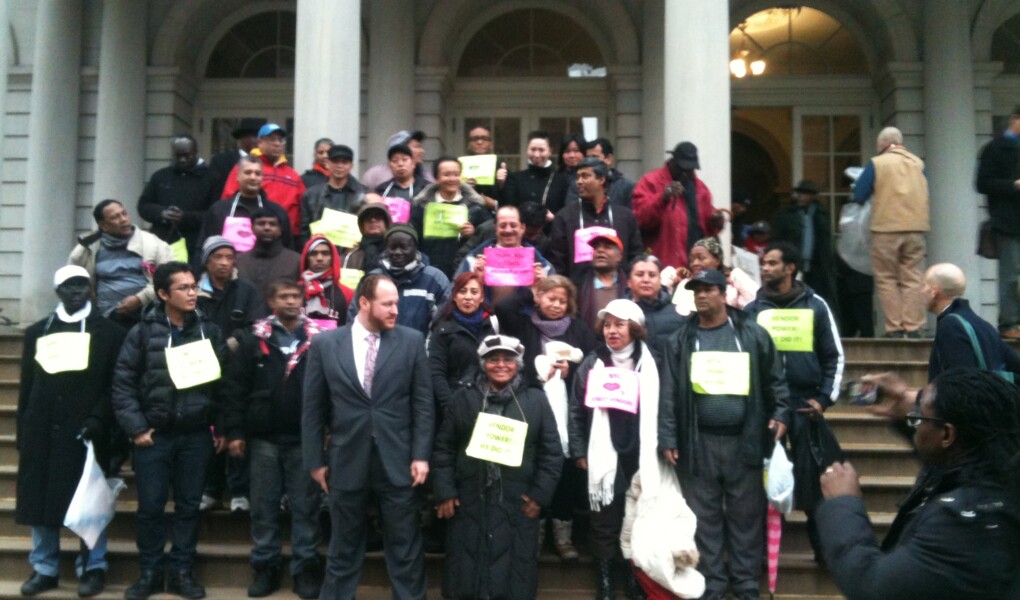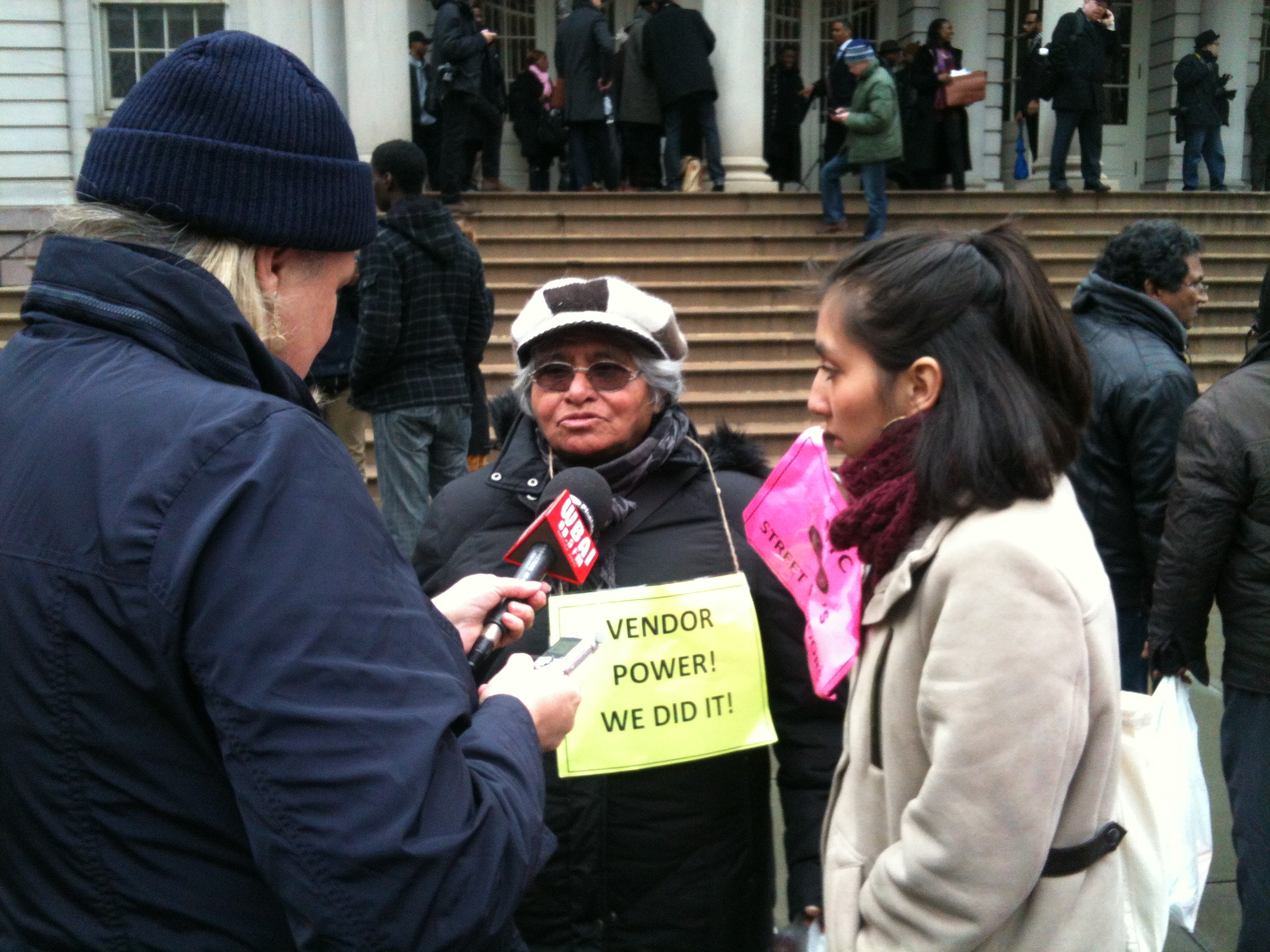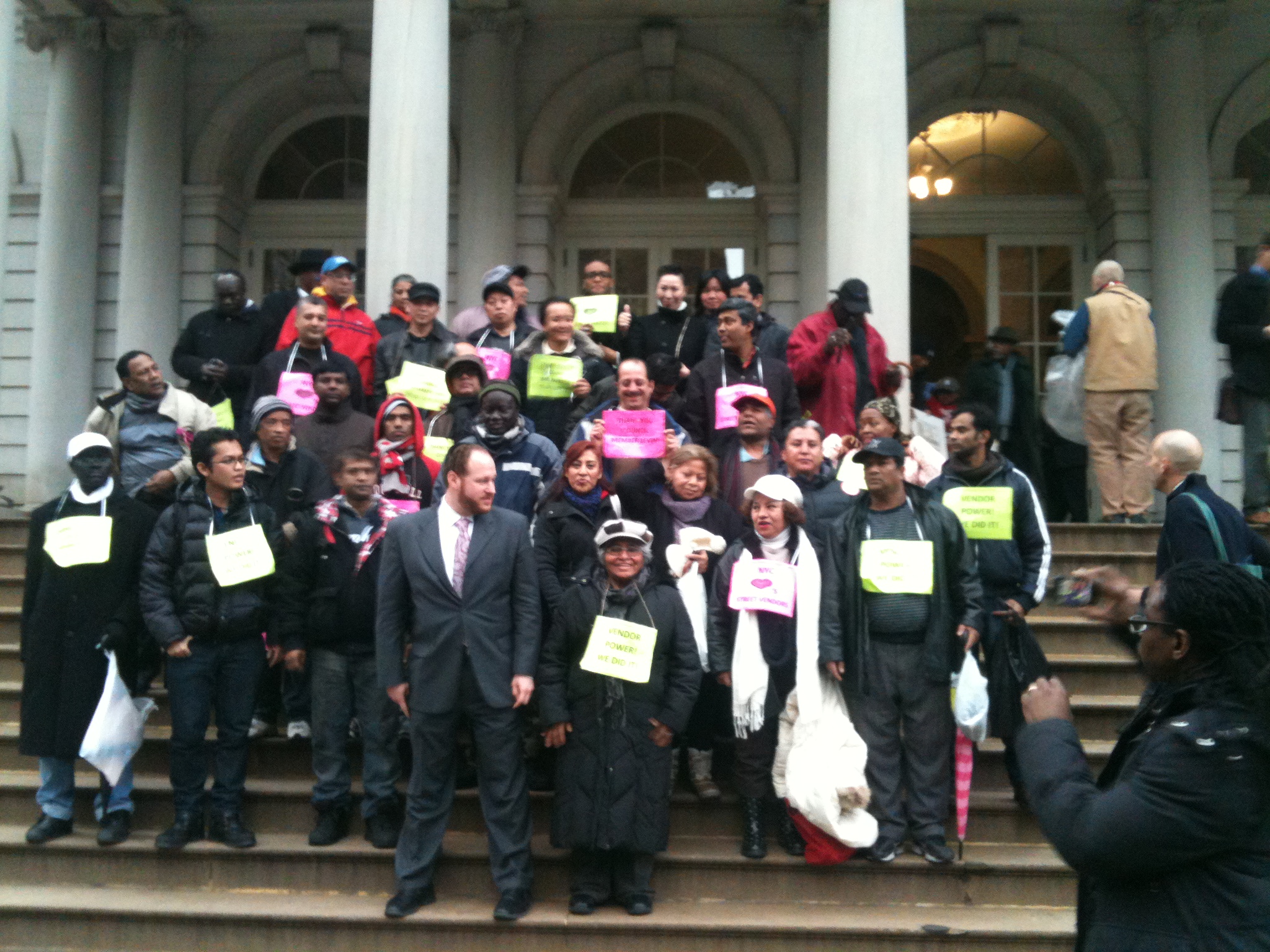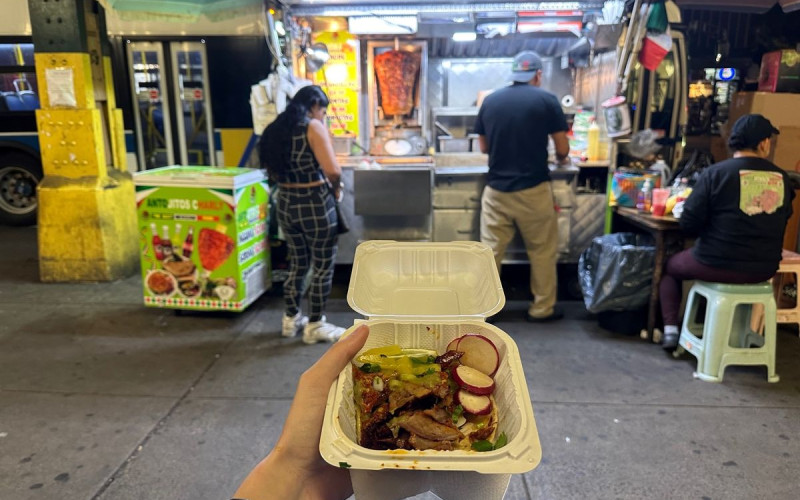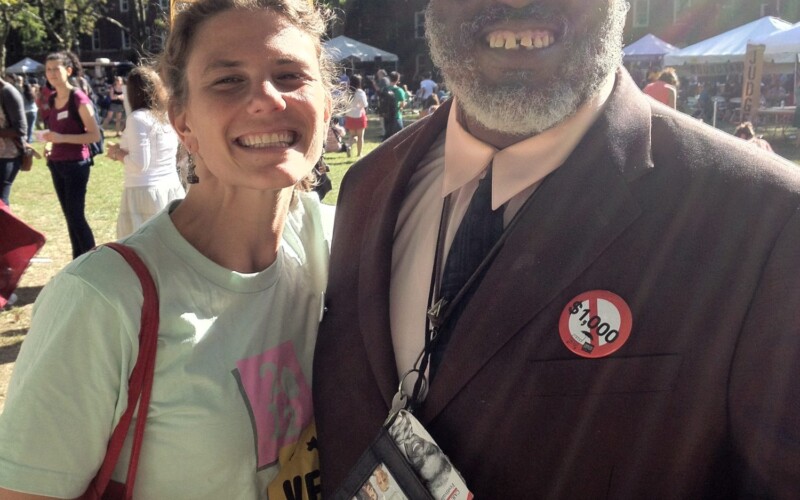As promised, Wednesday was an inspiring day, the culmination of years of hard work and campaigning by our partners, vendors, and friends. Though a seemingly small piece of legislation was approved by the New York City Council (and it’s not law yet, as the mayor has promised to veto it), it is something that will have a real impact on the lives of thousands of workers in this city, and the proceedings brought attention to important issues that usually get little public notice.
Our team members Cindy VandenBosch, Rich Garr, Andrew Gustafson, and Brian Hoffman were on hand for the session, though we saw them from slightly different vantage points – Cindy and Rich, from inside the City Council chamber, amidst vendors and supporters; Andrew and Brian, from the sidewalk outside the City Hall gates, then Andrew from an office computer via streaming video.
By an overwhelming majority, 44-3, the City Council voted to approve a package of legislation that made changes to rules and regulations affecting street vending. This legislation will, among other things, reduce the maximum graduated fine for minor violations to $500 from $1,000, and change the fine schedule so that only repeated violations of the same rule would result in graduated fines up to the $500 limit. Under current law, receiving four tickets for any administrative violation – including improperly displaying a license or being inches off in your cart’s positioning – within a two year period incurs a $1,000 fine, as does every subsequent ticket. This imposes a tremendous and needless burden on vendors, leaving the vast majority of tickets unpaid and forcing many vendors out of the business (read more about this here).
There were some trade-offs in the bill, however. It will also prohibit all vending from streets and sidewalks at taxi stands (this previously only applied to merchandise vendors) and in hospital zones (only food trucks were banned from this zone), or within 20 feet of an entrance or exit to any building (previously an ambiguous rule regarding residential buildings). The rule changes also do not affect violations that directly impact public health, such as unsafe food handling and preparation.
The City Council also wanted to hold regulatory agencies to task, mandating that the departments of Health and Consumer Affairs issue annual reports on renewals and denials of vending permits, with justifications for each. The Environmental Control Board, which adjudicates all citations issued to vendors by city agencies, will be required to issue quarterly reports on the status of those adjudications. And unlike in the past, when inspectors and police often issued tickets just to the vendor who happened to be working at the time, these officers will be required to note the number of the vending permit, which is attached to the cart or truck, so that the permit holder and business owner can be held accountable for these tickets.
But before any of this legislation was entered into the public record, debated, or voted on, vendors came out to show their support and express their thanks to the council members who shepherded through through to this day. In fact, more than 100 vendors came to City Hall, most of them sacrificing a day’s wages to be there. As Cindy approached the Street Vendor Project‘s (which is a partner on our Food Cart Tours) rally outside City Hall at around 1pm, there was a crowd of vendors and reporters gathered outside the gates. It was a celebratory atmosphere with vendors and organizers wearing florescent signs around their necks with slogans such as, “NYC ♥’s vendors,” “Thank you Speaker Christine Quinn,” and “Thank you Councilman Levin!” Every now and then, vendors would shout out, “Si, se puede!” or “Vendor Power!”
Within 15 minutes, Cindy, Rich, and a Street Vendor Project volunteer were waved into the security gate by a police officer. At the bottom of the City Hall steps, they and several vendors gathered to wait for the rest of the rally participants to join them, but after 30 minutes of waiting, it became clear that security was not letting in any more members of the public. Members of the press milled about looking for vendors and advocates to interview – street vendor and SVP board member Helodora Vivar-Flores was a minor star, interviewed by several reporters.
Cindy and Rich went inside the chamber and the balcony was filled with vendors, most of whom were immigrants from places like Mexico and Bangladesh. They were hot dog and roasted nut vendors from Times Square, halal cart owners from SoHo, the Financial District, and Midtown, taco cart vendors from Queens. They came to represent themselves and their businesses, but they also came as representatives of street vendor advocacy organizations, including the Street Vendor Project and Vamos Unidos. For years – really, ever since the city increased the maximum fine to $1,000 from $250 in 2006 – they have fought hard to educate the public about these issues, navigate treacherous city politics, and get this bill brought to a vote.
After the City Council session was underway, Speaker Christine Quinn finally introduced the street vendor bill, which had been languishing without a vote since coming out of committee in April 2012. Quinn lauded the community organizations that had been pushing for the changes, who, she said, “have been active, and well organized, and respectful, and forceful in their process of advocating for this package of legislation.” She made no mention that her face had been plastered across dozens of food carts across the city by the Street Vendor Project imploring her to bring this vote, though some of her colleagues later did jokingly in their remarks.
Debate began with the bill’s principal sponsor, Daniel Garodnick (Council District 4), who appealed to the long history of street vending as a way for immigrants to get ahead, a tradition that continues today. “Although Silicon Valley has made the idea of a start-up culture popular, we shouldn’t forget that long before tech companies existed, street vendors, which have a relatively low cost of entering business, were the original start-ups. Yet despite this long history, many ambiguities in vending laws remain, frustrating vendors and the public alike.” Another sponsor, Stephen Levin (CD 33), raised the point that lower fines will actually increase revenue, as vendors will be more willing and able to pay, something completely lost on the mayor (the bill was also sponsored by Gale Brewer with amendments by Melissa Mark-Viverito).
Charles Barron (CD 42) raised an important issue affecting vendors that was unaddressed by this legislation: the cap on the number of vending permits in the city. Those caps have remained unchanged for more than 25 years, despite increasing demand, meaning aspiring food and merchandise vendors can wait for more than a decade for a permit to become available. This makes it difficult for vendors to own their own businesses, and it has allowed an unregulated market in permit “renting” to develop. While the legislation did not address the cap issue, it will do something to address absentee permit owners who either don’t work on the street or rent out their permits to other operators. Rather than just issuing citations to the vendor who happened to be working that day, inspectors from all city agencies will now be required to note the number of the cart or truck’s permit, tying that violation to the actual permit holder, and not just their employee or renter.
Perhaps the most dramatic gesture in the chamber today was done, unsurprisingly, by Councilman Robert Jackson (CD 7), who held up a sticker from the Lower the Fines campaign, with the now familiar “$1,000” with a red line through it, and tore it up. “As individuals that are struggling to feed your families, a thousand dollar fine is absolutely absurd and ridiculous.”
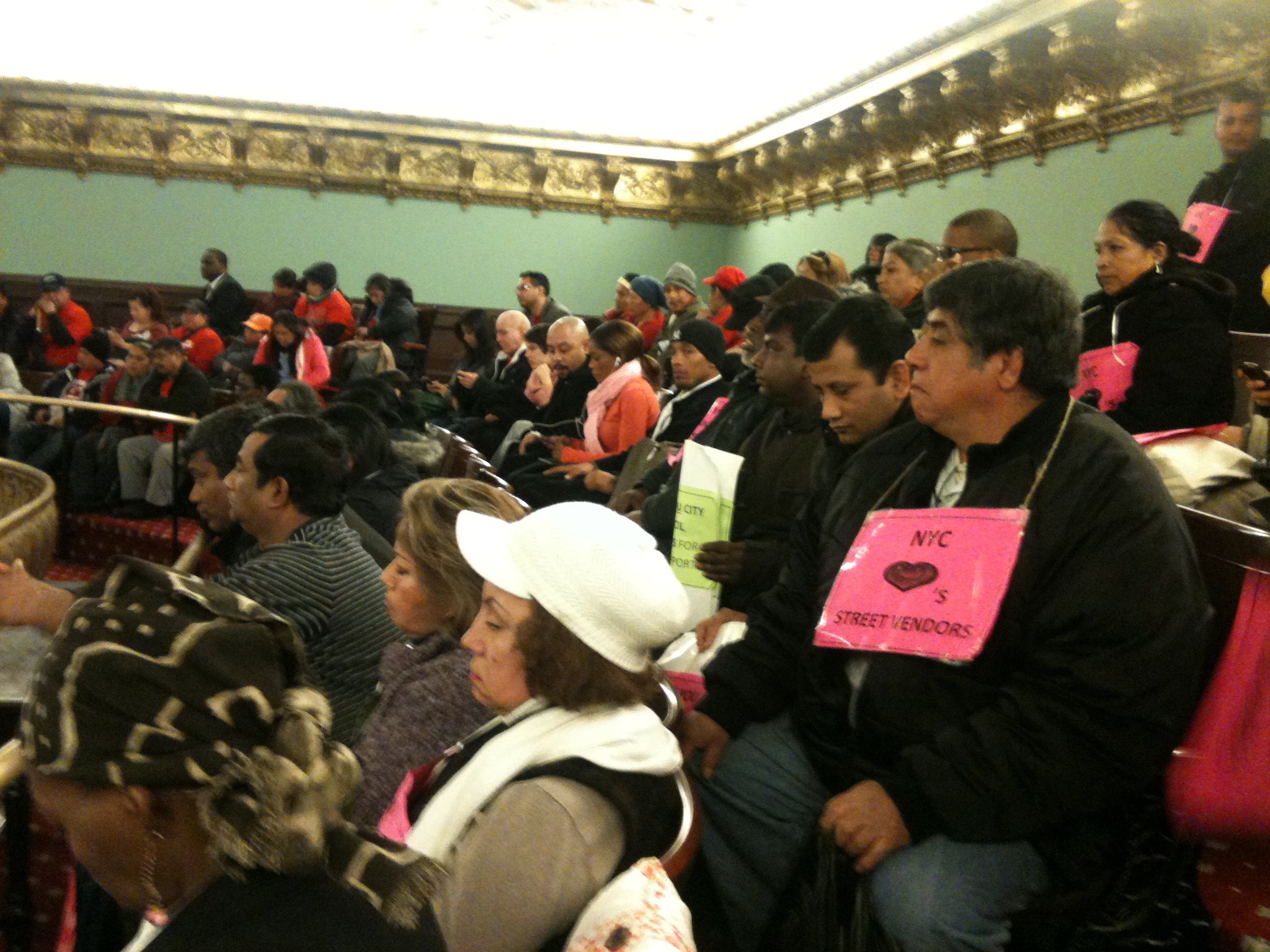
On the other side, Vincent Gentile (CD 43) offered an impassioned opposition to the legislation, arguing that reducing fines for street vendors while doing nothing to ease regulatory burdens on brick-and-motar businesses was unfair. “We need to level the playing field,” he testified, “but today we are tilting the scales.” Gentile made no mention of the fact that in 2006, when fines on vendors were increased fourfold, there was no corollary increase for storefront businesses.
From that point forward in the session, many members played on this theme, relaying horror stories from constituents about pernicious and punitive city inspections of their restaurants. With consensus settled and passage assured before the session even began, council members directed their attention to city agencies, particularly the Department of Health. They were referred to variously as”preying,” “destructive,” and “wanton.” Vincent Ignizio (CD 51) offered his support for the street vendors, but again intoned against city agencies “preying” on small businesses. “The Department of Health is viewing our restaurants, our vendors, as a cash cow for the rest of this city, and it has to stop.” He then delivered a line that met with uproarious applause from the vendors in the balcony: “I think sometimes the Department of Health and the inspectors therein come out and they give out these [tickets] like candy, and they don’t appreciate how many hot dogs you have to sell to make a thousand dollars, how many gyros you have to sell to make a thousand dollars.”
On the one hand, this discussion seemed to veer the deliberations off course, away from the issues affecting street vendors. Of all the constituent stories of harassing inspections and punitive finess brought up by council members, none of them were about street vendors, despite the fact that these are innumerable daily occurrences. But on the other, it was refreshing to hear members talk about street vendors and restaurants in the same breath, subject to the same regulations – and abuses – of city agencies like any other small business.
Throughout the proceedings, the balcony was bubbling with excitement, with bursts of applause and the occasional cheer. Everyone seemed to understand the need for decorum, but you could not help but respond to the council members below who were praising and gesturing towards the vendors. At one point, Cindy got so caught up in the excitement that she burst into thundering applause, as if it were a standing ovation. She was promptly shushed by the usher, but she wasn’t the only one who got a bit carried away. It was a tense, emotional moment.
Meanwhile Andrew, after standing outside the City Hall gates for 45 minutes with no hope of getting in, decided to retreat to his office and watch the proceedings on streaming video (which offered a much better view than the balcony) and Twitter. After giving our Food Cart Tour of the Financial District, Brian came over to express his support outside the gates. Sean Basinski, the Street Vendor Project’s founder and director, was also stuck on the wrong side of the fence in the cold. But when people exited City Hall and places opened up in the chamber – Rich left the session to offer his seat to someone else – Sean gave up the spot to make sure as many vendors as possible could be inside to witness this event.
Then it was time to vote. Dissenting voices were few, though some council members cast their “aye” votes with the addendum that something be done about burdensome regulations and fines affecting small businesses. It wasn’t until the vote itself that we truly comprehended the historic meaning of the day for the vendor community. As each council person was called, and it was clear that the bill would pass with an overwhelming majority, Cindy’s eyes began to fill with tears. She felt truly grateful to experience that moment and to be among so many vendors who had fought to have their voices heard. Being there as 44 council members expressed their support was moving, and it was a day that we will always treasure.
After the session ended, vendors mingled with council members to express their gratitude. One handed Speaker Quinn a bouquet of flowers. Stephen Levin posed for pictures. The audience of vendors and volunteers then gathered on the steps of City Hall for photos. Again, Sean made sure the as many vendors could be a part of it as possible, calling out from the steps, “Wait, there are still more people coming,” as vendors streamed out of building. A Street Vendor Project staff member celebrated her birthday, and everyone formed a circle in front of City Hall to sing happy birthday to her.
All in all, a great day to be a New Yorker. Vendor Power!
[snippet slug=’food-tour-footer’]

